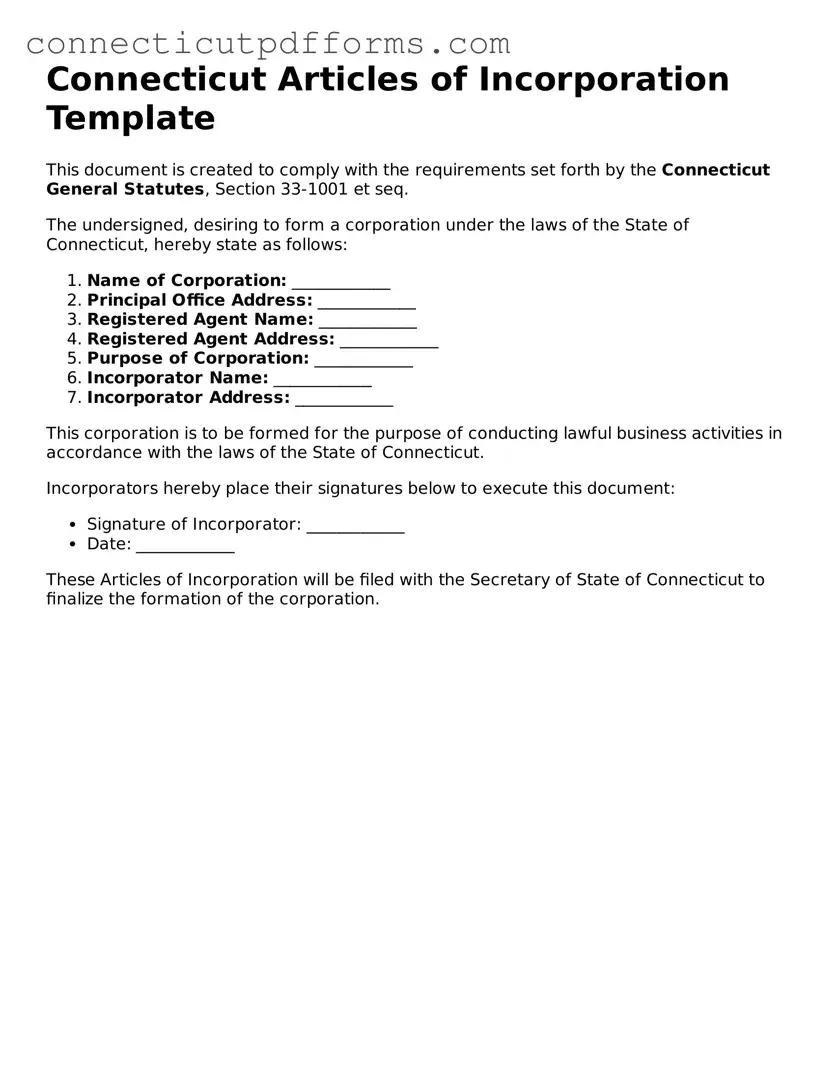The Articles of Incorporation form in Connecticut is similar to the Certificate of Incorporation used in many other states. This document serves the same fundamental purpose: to officially create a corporation under state law. It includes essential information such as the corporation's name, the purpose of the business, the registered agent, and the number of shares authorized. Both documents are filed with the state's Secretary of State and are critical for establishing a corporation's legal existence.
Another comparable document is the Bylaws of a corporation. While the Articles of Incorporation establish the corporation's existence, the Bylaws outline the internal rules and procedures for governance. They detail how meetings are conducted, how directors are elected, and the roles of officers. Bylaws are not typically filed with the state but are essential for the corporation's operation and can be amended as needed by the board of directors.
The Limited Liability Company (LLC) Articles of Organization shares similarities with the Articles of Incorporation. Both documents are used to create a business entity recognized by the state. The Articles of Organization includes information such as the LLC's name, its purpose, and the registered agent. Like the Articles of Incorporation, this document must be filed with the state to confer legal status on the LLC.
The Partnership Agreement is another document that serves a similar function for partnerships. While it does not create a legal entity like a corporation, it outlines the rights and responsibilities of each partner. This agreement details how profits and losses will be shared, how decisions will be made, and the process for adding or removing partners. It is essential for the smooth operation of a partnership and can help prevent disputes.
The Certificate of Good Standing is akin to the Articles of Incorporation in that it provides proof of a corporation's legal status. This document confirms that a corporation has complied with state regulations and is authorized to conduct business. It is often required for various business transactions, such as obtaining loans or entering into contracts.
Understanding the importance of documents like the Motorcycle Bill of Sale is crucial for anyone involved in motorcycle transactions. Just as with various incorporation forms, having a clear and well-defined agreement ensures that both parties are protected during the sale process. For those seeking a reliable template to facilitate this, refer to the Templates and Guide to streamline your transaction and safeguard your interests.
The Employer Identification Number (EIN) application, also known as Form SS-4, is similar in that it is necessary for a corporation to operate legally. The EIN serves as a unique identifier for the business for tax purposes. Obtaining an EIN is essential for opening bank accounts, hiring employees, and filing taxes. It is a critical step following the filing of the Articles of Incorporation.
The Annual Report is another document that relates to the Articles of Incorporation. Corporations must file this report periodically to maintain their good standing with the state. The report typically includes updated information about the corporation's address, management, and financial status. It ensures that the state has current information about the corporation and is a requirement for continued legal recognition.
The Statement of Information is similar to the Annual Report but is often required shortly after the formation of a corporation. This document provides the state with key information about the corporation, including its officers and directors. It is essential for maintaining transparency and ensuring that the corporation complies with state regulations.
The Operating Agreement, particularly for LLCs, is comparable to the Bylaws of a corporation. This document outlines the management structure and operational procedures of the LLC. It details member responsibilities, profit-sharing arrangements, and decision-making processes. Like Bylaws, the Operating Agreement is crucial for the internal functioning of the business.
Lastly, the Foreign Corporation Registration is similar in that it allows a corporation formed in one state to operate in another. This document is necessary for compliance with state laws when a corporation wishes to conduct business outside its state of incorporation. It typically requires the corporation to provide a copy of its Articles of Incorporation and other relevant information to the new state.

